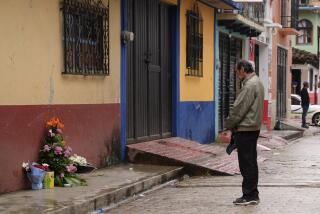Vice President of Paraguay Is Assassinated
BUENOS AIRES — Gunmen wearing military fatigues assassinated Vice President Luis Maria Argana of Paraguay on Tuesday in a brazen street ambush in the Paraguayan capital that left one of Latin America’s uneasiest democracies in an uproar.
Argana’s allies in the bitterly divided ruling party immediately accused former Gen. Lino Oviedo, who is considered the power behind the throne and was the dead man’s longtime rival, of masterminding the slaying.
President Raul Cubas Grau, a close Oviedo ally, went on national television to announce the shutdown of the nation’s borders and a police dragnet for the killers.
“Paraguay and its people need order and tranquillity,” said a visibly troubled Cubas. “Dr. Argana’s sacrifice must show us the way.”
As the president met with military leaders, Congress called an emergency session, unions announced a general strike, and enraged demonstrators demanded the president’s resignation. There was widespread doubt about Cubas’ willingness and ability to solve the crime and perhaps even about his capacity to retain control of the nation.
Although Paraguay has a deep-rooted tradition of smuggling, gangsterism and corruption, political assassination has not been anywhere near as commonplace as it is in Colombia or Mexico. Tuesday’s killing marked the start of a dangerous and potentially destabilizing new era, said Carlos Martini, a prominent political analyst.
“There was not a tradition of political crimes here,” Martini said in a telephone interview. “The last assassination was in 1902. We are living moments of great conflict and tension.”
The assassination took place about 8:50 a.m. when a blue Fiat intercepted the vice president’s red Nissan Pathfinder as he was being driven to his office in the capital, Asuncion. Four men dressed in military camouflage uniforms and armed with an M-16 rifle, a shotgun and hand grenades unleashed a barrage that killed Argana, 66, and his driver and wounded two bodyguards, one critically. The assassins piled out and finished off the vice president at close range, witnesses said.
Television footage showed a bodyguard walking in a daze at the scene, his face a mask of blood, calling for help over a hand radio. Argana, wearing a white shirt, was slumped in the back seat of the bullet-riddled Pathfinder.
The killers burned the Fiat nearby and switched to another getaway vehicle, the president told reporters. Cubas also said Argana had rejected an offer of government bodyguards, preferring to use his own.
Among the leaders who quickly denounced Cubas was former President Juan Carlos Wasmosy.
“We are witnessing the installation of criminal violence as a system of domination, and terror as an instrument of government,” declared Wasmosy, who was the target of a coup attempt by Oviedo in 1996 and ordered his arrest the following year. “The man who is responsible for this situation of chaos, violence and now blood is the president.”
Oviedo, meanwhile, made no public statement.
In Washington, the State Department condemned the killing.
The slain Argana was leading an impeachment drive against Cubas. Their feud dated back to last year, when the presidential candidacy of Oviedo, a former army chief, was interrupted by his arrest for attempting the coup. Cubas and Argana made peace long enough to win election on a hastily assembled new ticket of the Colorado Party, a fractious but powerful political machine that has ruled Paraguay for half a century.
The intraparty hostilities resumed when Cubas defied the Supreme Court and released Oviedo from prison a few days after taking office. The ensuing struggle resulted in the impeachment initiative, which is scheduled for debate in Congress on April 7.
In recent months, gunmen had opened fire on Argana’s house. He continued to insist that Oviedo be returned to prison, and supporters of the vice president scuffled with people loyal to Oviedo at Colorado Party headquarters. Oviedo’s rhetoric and tactics have been aggressive and occasionally menacing. In December, he threatened to bury alive his enemies on the Supreme Court.
Argana was a former Supreme Court justice and Colorado leader who rose to power under dictator Alfredo Stroessner, whose ouster in 1989 after 35 years of rule paved the way for the return of democracy.
Argana was a solemn and courtly politician who, even during his brief truce with Cubas, made little secret of his distaste for Oviedo. During an interview with The Times before last year’s election, he described his grudging alliance with a perceived puppet of Oviedo as an example of political realism.
“After all, we all belong to the same party, we follow the same flags,” he said. “We are more coherent than the opposition. And our battles end up being battles within the same family.”
More to Read
Sign up for Essential California
The most important California stories and recommendations in your inbox every morning.
You may occasionally receive promotional content from the Los Angeles Times.










